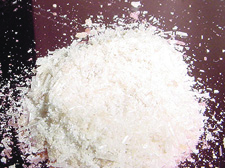|
|
 |
| |

Doctors are calling for action to tackle the rise in the popularity of the addictive drug ketamine, which is becoming a favourite among clubbers |
Dangers of ‘new ecstasy’ ketamine
UCL doctors issue warning over increasingly popular recreational drug following study
HAPPY, smiley faces. Illegal warehouse raves. The death of Leah Betts.
The pill-popping generation of ecstasy-takers in the late 1980s and 1990s were characterised as a bunch of fun-loving criminals – dancing the night away under the shadow of death.
Fears over the immediate and long-term dangers of the Class A drug were whipped up into a mass moral panic by at time.
Now ketamine, a powerful hallucinogenic general anaesthetic that gives users a short-burst trip out of body and mind, is replacing ecstasy as the drug of choice in the clubs and house parties of Camden.
Experts at University College London attribute the rise to its powerful hit and low cost – around £20 per gram – and the decline of high-quality ecstasy.
They warn, in the country’s first comprehensive study of the drug, that ketamine, unlike ecstasy, should come with a severe health warning.
Their findings include evidence of brain damage, paranoid delusions, rotting bladders and all the classic symptoms of hard drug addiction.
Dr Celia Morgan said: “Currently ketamine is No 8 on the list of harmful drugs – classed below cannabis and ecstasy. That is completely wrong because you can get addicted to ketamine. You cannot get addicted to ecstasy. There is no evidence that there are any long-term dangers associated with ecstasy. Those fears over its side-effects were never borne out.”
Dr Morgan, who has worked as a research fellow at UCL for 10 years, said: “The Misuse of Drugs Act aims to signal to young people the harmfulness of drugs. We found that drug users rated legal substances such as alcohol and tobacco as more harmful than Class A substances like LSD and ecstasy. It shows to me that the classification system is not working.”
Scientific reason, when it comes to the classification of drugs, can be a dangerous game.
Just ask the government advisor Professor David Nutt who was sacked last month for arguing there was “not much difference” between taking ecstasy and riding a horse.
Dr Morgan and her team followed 150 volunteers for a year. Of these, 30 were taking large quantities of the drug nearly every day, 30 were taking it once or twice a month, 30 were ex-users, 30 used illicit drugs apart from ketamine and 30 did not use any drugs at all.
Analysis of patients’ hairs showed ketamine levels in the recreational users had doubled by the end of the year-long study.
Dr Morgan said: “That is a sign of addiction. They are experiencing a distortion of space and time. A feeling of melting into things.
“All of the ketamine users we studied showed some form of unusual beliefs, such as believing in telepathy or conspiracy theories. Frequent users were found to have problems with several aspects of their memory. Interestingly, healthy volunteers who had taken a single dose of ketamine did not have the same memory impairments, which suggests this may be a long-term effect.”
Dr Morgan said she had spent the weekend attempting to persuade NHS bosses – including NHS Camden – to fund treatment for ketamine addiction.
“Ketamine use is increasing faster than any other drug in the UK, particularly among young people, and has now become a mainstream club drug,” she said.
“The knock-on cost to the NHS is huge. But we have been told the commissioners do not think there is a real problem yet.”
She said “Special K” – a super-strength version of ketamine – caused the bladder wall to rot leading to blood in the urine and causing users to visit the toilet every 20 minutes.
“We have spoken to users who had their whole bladder removed,” said Dr Morgan. “That is a real disability. There are also ‘K Cramps’ – but we are not completely sure what causes them.”
She added: “Clinicians should also be aware of the adverse consequences of heavy use of ketamine, the symptoms of which may overlap with some forms of psychiatric disorders.”
Ketamine is a Class C drug which means that it’s illegal to possess it and to supply it. Possession can get you up to two years in prison. Supplying someone else, even your friends, can get you 14 years in jail and/or an unlimited fine.
• |
 |
|
|
| |
| |
| |
| |
|
 |
|